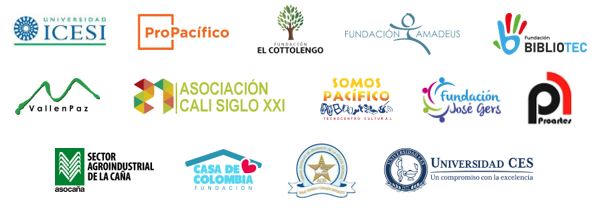Medical Directory
More than 500 full time specialists, who guarantee you appropriate care
View DirectoryO
P
U
P
U
International Medical Care
Click on the overview to see more information about our office
For the Fundación Valle del Lili, social responsibility is one of the pillars of its mission. For this reason, it creates and implements initiatives, projects and social and environmental programs that benefit its stakeholders and the community, according to our Sustainable Development Goals.

The Hospital Padrino Strategy is a model of social innovation in health that targets vulnerable populations and those at greater health risk in Colombia. In this sense, it seeks to contribute to equity in health care, timely access to quality health services, the promotion of knowledge, and the strengthening of physical infrastructure, with the ultimate goal of reducing preventable deaths and providing life opportunities.
Hospital Padrino is an example of a hospital collaborative model in which a high complexity, high quality public or private hospital (Hospital Padrino) within the regional context collaborates with and supports smaller healthcare providers (Sponsored Hospital). This partnership aims to improve the quality, timeliness and effectiveness of health services, all under the coordinated efforts of national, regional and local government authorities. The overall goal is to strengthen healthcare delivery across the spectrum by fostering a synergistic relationship between hospitals of different capacities.
Through training strategies that save lives, it aims to strengthen the knowledge and skills of the health teams of the sponsored hospitals, with workshops that combine theoretical and practical aspects, emphasizing the development of soft skills for teamwork and the humanization of care. In addition, the model strengthens telemedicine and directly improves the care conditions of users through the use of telemedicine or telecare strategies from Hospital Padrino, allowing patients from the sponsored hospitals to access specialized care and spend less time in their diagnoses.
Hospital Padrino supports the premise of decent hospitals for the Colombian population, helping the sponsored hospitals to adapt the hospital infrastructure so that they can offer services under the best standards. In this way, under the guidance and in alliance with the government, hospitals from low to high complexity and the community form integrated hospital networks that allow for better care and communication between the hospitals of this model.
December 2024 cutoff
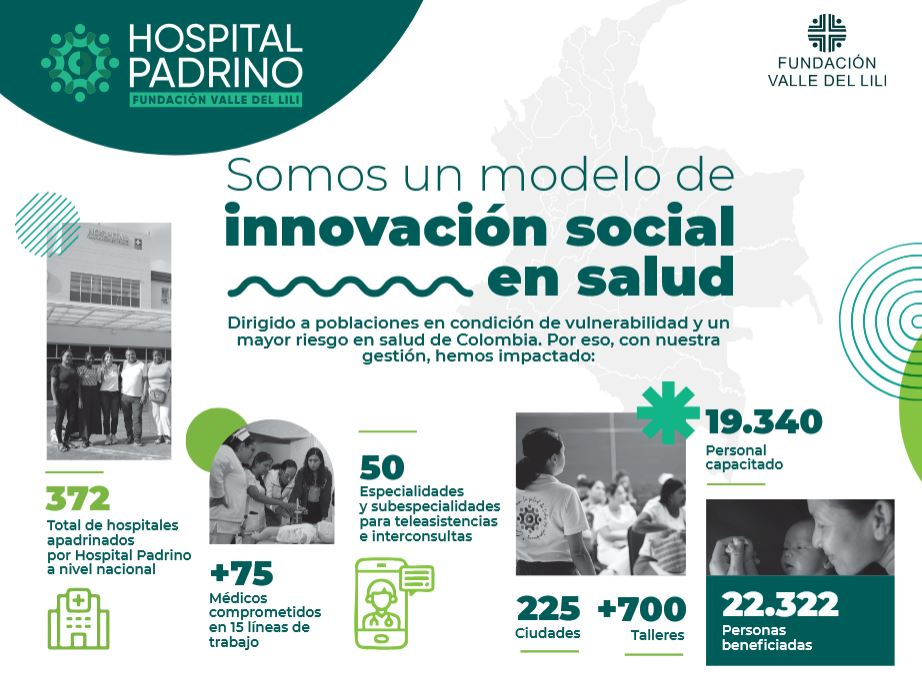
Implementors:

Public sector allies:

International cooperators:

Academy:

Pharmaceutical Industry:

Foundations:

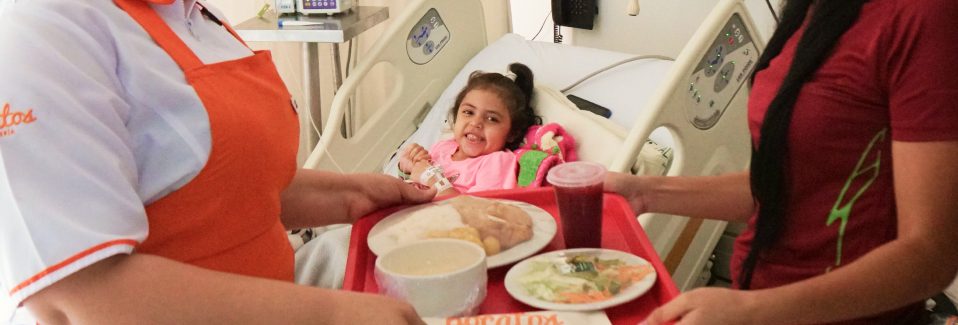
This means that in addition to the nutritional deficiencies caused by their disease, these highly complex patients do not have sufficient, nutritious, good quality food at home. The difficult socio-economic conditions of the families are the main reason for this situation.
As a result, many of these patients do not receive the daily number of meals they need to achieve adequate nutrition, which can help them recover better and lead active and healthy lives.
The Alimentando Esperanzas program was created at the end of 2021 to combat food insecurity and promote good nutrition among these patients. In this way, it can reduce the inequality gaps that arise when social factors put children at a disadvantage during the process of illness and recovery.
For Fundación Valle del Lili, it is a priority to create programs and interventions that help children in vulnerable conditions to have the same opportunities for recovery as other minors who, although they have the same disease, do not have the same barriers.
The focus areas of the program are
To identify patients who are severely or moderately food insecure, the Latin American and Caribbean Food Insecurity Scale (ELCSA for its acronym in Spanish) is applied to all pediatric patients diagnosed with cancer, transplants or severe heart disease who are identified in the inpatient setting. They also receive an initial medical and nutritional assessment.
Families of patients enrolled in the program receive a monthly food kit that covers 70% of the household's nutritional needs. For each case, the timing of the delivery of the kit is determined based on several variables, including the diagnosis, the stage of treatment, the patient's nutritional status, and the level of food insecurity. The program provides food aid to patients living in different regions of the country.
To address food insecurity, in addition to ensuring access to food, families need to learn how to improve their eating habits and make the best nutritional choices, even when they don't have enough money. This area will contribute to the sustainability of the intervention once the food aid is stopped. The educational process focuses on the family unit because of its influence on the child's development. It is assumed that if the family is properly nourished, the children will also be nourished in the short, medium and long term.
In addition, two types of follow-up are carried out. The first is a social follow-up, which examines the current social situation of the family and the evolution and condition of the patient. The second is the nutritional follow-up, which is carried out with a medical evaluation every 4 months. This last monitoring is documented in the patient's medical history. All beneficiaries receive assistance for a period of at least one year.

assessment of Food Insecurity Conducted.

of evaluated pediatric patients experience severe and moderate food insecurity.

pediatric patients enrolled in the program.
are patients diagnosed with cancer.
are transplant patients.
are patients with cardiovascular diseases.
social follow-ups conducted.

food aids were delivered in 2023
medical and nutritional consultations were conducted in 2023.
social follow-ups were conducted in 2023.

microporous clay filters for water purification were delivered in 2023.
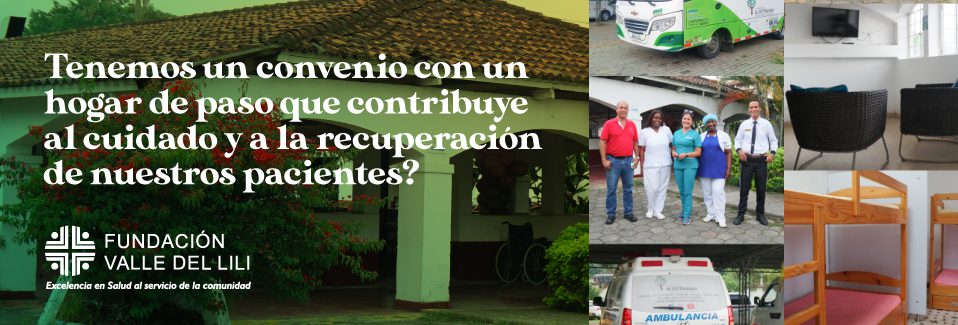
Fundación Valle del Lili, in agreement with Alonso Ocampo Foster Home, provides temporary accommodation to patients who:
The Foster Home is also ideal for patients who:
In these cases, FVL may request that the home care service be assigned to the foster home.
The agreement with the Alonso Ocampo Foster Home offers, free of charge:

patients have benefited since the beginning of the agreement.

patients benefit annually.

of the patients completed their medical treatments.
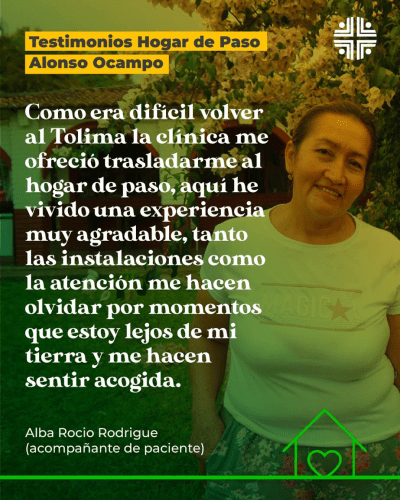
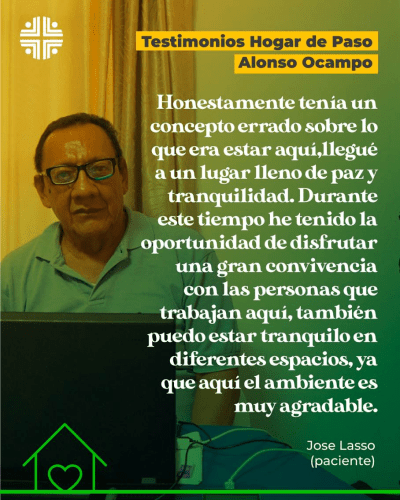

In search of more accessible and inclusive health care for the poor population, FVL has a humanitarian aid program that helps alleviate basic needs that have more vulnerable patients and companions. The program has scope to the different headquarters of the institution and has 4 types of aid:
The cases of patients and families interested in receiving one of these grants are evaluated separately through a socio-economic survey to verify whether or not the applicants meet the criteria necessary to be beneficiaries. The criteria are defined in the Institutional Policy of Social Assistance to the Most Vulnerable Population.
of caregivers of hospitalized patients in vulnerable conditions receive food aid (across all locations).
food aids are delivered annually.
average caregivers of patients benefit from monthly food aids.
invested in humanitarian aids.
contact the Social Responsibility Unit directly at: PBX. 602 3319090 extensions: 4235 and 4859.
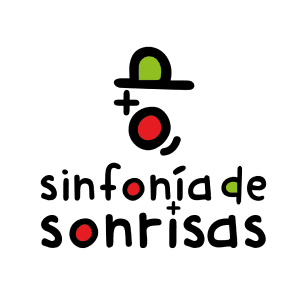
Through play, humor and laughter, the goal is to change the dynamics of the hospital and improve the health of the patients, regardless of their age. This group is made up of citizens of Lili who voluntarily decide to train as hospital clowns, maintaining their standards thanks to continuous training and learning about clowning techniques.
The main objectives of the Sinfonía de sonrisas are to:
patients and family members intervened within a year.
Lili citizens participated in educational campaigns and interventions.
organizational educational campaigns.

interventions and consultations with patients and family members in a year.
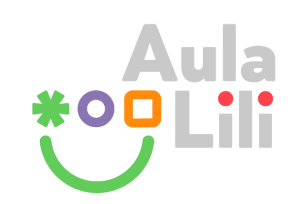
The Aula Lili program is based on two theoretical and practical frameworks: hospital pedagogy and inclusive education. The main objective is to accompany pediatric patients and their families in a human and sensitive way, so that the health care process, inside and outside the hospital, becomes an opportunity for learning, development and personal growth. Playfulness and the creation of meaningful educational experiences are fundamental tools to achieve this goal.
The program has the following specific goals:
El Aula Lili achieves its objectives through fundamental axes:
The team of El Aula Lili is interdisciplinary. It has the contribution of psychologists, occupational therapists, professionals in bachelor degree and professionals in recreation. The program covers all the pediatric services of the institution.
of pediatric patients with over 10 days of hospital stay benefit from the Lili Classroom (4th floor pediatrics).
attentions are provided by the Lili Classroom annually.
hospital classes have been conducted since the beginning of the school axis./p>
consultations provided to parents and caregivers regarding school continuity.

connections made with schools.
patients served through the school program.

The medical team of the Global Spine Outreach Foundation (United States) and the Fundación Valle del Lili, organized by the Fundación Casa de Colombia and supported by the company Medtronic, meets semi-annually at the facilities of the Fundación Valle del Lili to follow up on the children and perform the necessary surgeries.
For these patients, continuous and timely care is essential to improve their quality of life. The impact of these days is to give children the opportunity to grow up in better conditions and to give them and their families all the support and confidence they need.
If you know a child under the age of 17 who could benefit from this day, please contact Fundación Casa de Colombia at the following numbers in Cali: 6026613856, 6026670248, 3227802902.
sessions have been conducted between the years 2001 and 2023.
years of biannual sessions.
surgeries performed annually.
annual clinical follow-ups.
surgeries performed since the year 2001.


Through interdisciplinary work, volunteers from Fundación Operación Sonrisa together with our specialists carry out timely and comprehensive treatment in these medical-surgical sessions for patients, which include: assessment for plastic surgery, dentistry, speech therapy, pediatrics, anesthesia and taking laboratory exams.
Interested families must register children for the day and verify the dates on which they must be present.
These days are held in two days: a Friday and a Saturday. On the first day, the plastic surgeon evaluates the patients and, according to the medical and prioritization criteria of Operación Sonrisa, those who are candidates for surgery are selected. If these patients receive approval from the pediatrician and anesthesiologist, their surgery is performed the next day. A week later, post-operative control is performed with the plastic surgeon.
At all times, families are supported by an interdisciplinary team made up of pediatricians, anesthesiologists, nurses, psychologists, social workers, among others.
If you know a child, adolescent or adult with a diagnosis of cleft lip and cleft palate, who can benefit from these days, we invite you to contact the following numbers: 3142381719, 3212052806, 3212052359
annual sessions.
assessments per year.

assessments per year.
volunteers.

Dentistry, paediatrics and gynecology are currently being held.
Thanks to various alliances with foundations, NGOs, Child Development Centers (CDI for its acronym in Spanish), protection homes and schools, others, FVL professionals can reach the populations with the greatest need for accompaniment.
patients benefited since the beginning of the sessions.
dentistry sessions with 3,861 beneficiary patients, from 2021 to 2023.
pediatric sessions with 835 beneficiary children, from 2021 to 2023.
gynecology sessions with 293 beneficiary women, from 2021 to 2023.
volunteers.
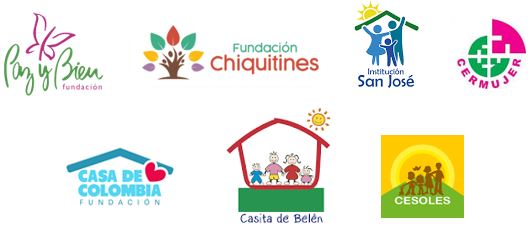
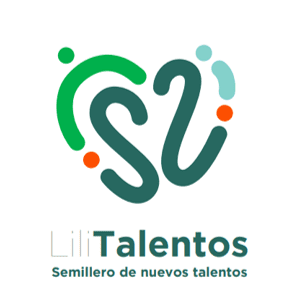
Contribute to the social development of the region through the support of young people with exceptional talents so that they can develop their potential and undertake life projects that have an impact on society.
Create scenarios in which young talents can put their ideas into action, develop competencies, broaden their horizons and build a solid, visionary and viable personal and social life plan.
Contribute to the overcoming of economic, social and educational barriers that prevent young people with exceptional talents from developing their potential.
Fundación Valle del Lili, according to its possibilities, makes donations to external organizations that lead programs that contribute to the social, cultural and economic development of the city and the region.
million in external donations in 2020.
million in external donations in 2021.
million in external donations in 2022.
million in external donations in 2023.
